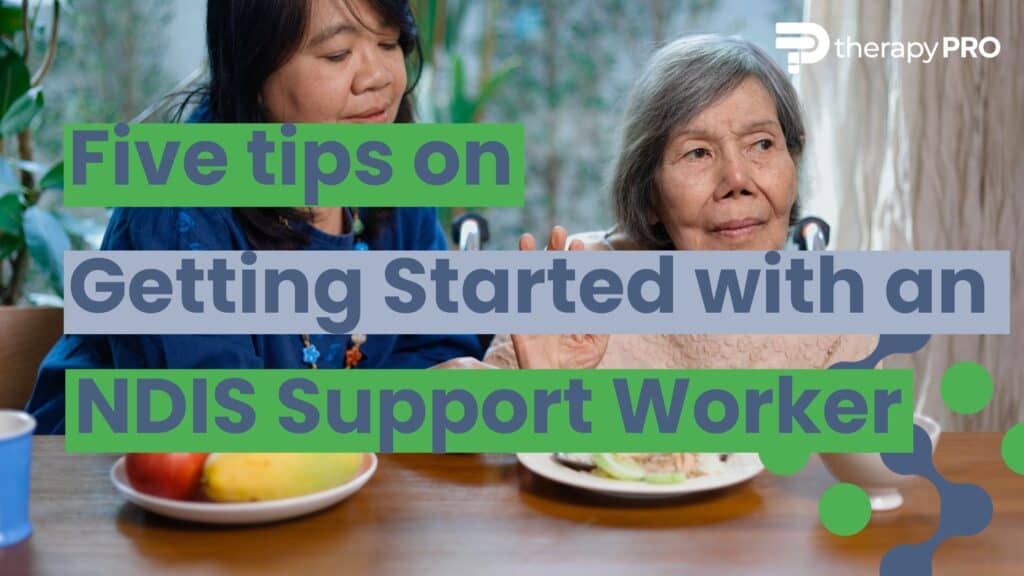Tips on getting started with a NDIS support worker
Are you a National Disability Insurance Scheme (NDIS) participant looking for support to achieve your goals and enhance your independence? An NDIS support worker can be an invaluable ally on this journey.
In this article, we’ll provide you with practical tips to help you get started with a support worker.
Whether you’re new to the NDIS or looking for a new support worker, these insights will guide you in finding the perfect fit.
You can also access this article as a downloadable guide here.
What is the role of a NDIS support worker?
Support workers help people with disabilities by providing care and support services as part of the NDIS.
They are employed or engaged to help someone with a disability to navigate daily life and access critical services and supports. Some areas of support, care, and assistance include:
- Daily personal activities such as meal preparation, household chores, administering medication.
- Transport to enable participation in community, social, economic, and daily life activities such as going shopping, visiting the doctors, meeting friends, and finding a job.
- Social support such as helping someone with their hobbies and interests, finding or engaging in community groups, or learning new skills.
They work closely with their clients to offer the support, guidance, and encouragement necessary to help achieve their goals and live fulfilling lives.
It’s important to note here that support workers differ to social workers. Read more about common misconceptions about social workers to learn the difference.
Another important and often misunderstood stakeholder in the NDIS support care space are support coordinators. They provide a different type of service and care compared to support workers.
But let’s dive into more about support workers!
How to find the right support worker for you
Finding the right support worker is crucial for building a positive and effective relationship. And if this is the beginning of your journey, it is understandable if you’re unsure of where to start.
Follow these steps:
1. Define your needs and goals
Take some time to articulate your specific requirements and what you hope to achieve with the help of a support worker. For example, are you seeking assistance with personal care or perhaps looking to develop new skills? Being able to define your goals will help you find the right person to fit your needs.
2. Seek recommendations
Reach out to your network, support groups, or local disability organisations. Hearing first hand experiences and recommendations from others who have worked with support workers can provide valuable insights.
There are also many organisations who can assist you in finding a support worker. The NDIS has a list of providers and Mable is a service that connects you with support workers directly from their site.
3. Interview potential support workers
Arrange interviews with potential support workers to get a sense of their skills, experience, and personality. It’s important to find someone you feel comfortable with and who shares your values and goals.
If you are a parent or a carer of an NDIS participant, then ensure you include your family member in the interviews so that they are a part of the decision-making process. It’s important that the support worker and their potential client have an opportunity to meet and connect prior to work commencing.
4. Consider qualifications and certifications
Verify the qualifications and certifications of potential support workers to ensure they have the necessary expertise and training to meet your specific needs. This step ensures you receive quality support.
Again, the NDIS website offers invaluable resources in designing selection criteria or developing job descriptions – should you be looking to advertise to fill the role.
5 tips on getting started with a support worker
So, you’ve found a support worker that you connect with and you’re ready to make a start on reaching some goals – fantastic!
However, like all worthwhile and healthy relationships in life, the partnership you create with your support worker will require some time and attention.
Remember, the road should be smooth rather than bumpy!
Keep these friendly tips in mind when you first get started with a support worker:
1. Establish open communication: talk and listen
Clearly communicate your expectations, preferences, and any concerns to your support worker. It’s important that they know what you need and what you like. They’re here to help you, so sharing information openly and consistently will ensure your needs are met.
2. Set goals that make you feel good and are achievable
Work together to set realistic goals that align with your aspirations and abilities. Maybe you’ve always wanted to learn how to paint or cook. Or maybe you want to get out of the house more and into the community. Choose a goal that makes you feel good, and then when you reach it, celebrate!
3. Ask questions to build rapport and trust
Take the time to get to know your support worker on a personal level. You might be spending quite a bit of your time with them! Ask questions about their interests away from work. It’s much more enjoyable working with someone when you form a genuine relationship based on mutual respect.
4. Give feedback, it’s important
Regularly provide constructive feedback to your support worker. It’s important to be open and honest. Maybe you have ideas about changing up the way things could be done. Your suggestions for improvement can help support workers to tailor their support and better meet your needs.
5. Review and reassess your progress
Every now and then, reflect on how things are going. Are you moving closer to your goals? Is there anything that needs to change? Reviewing your goals and progress in collaboration with your support worker will help you remain on track.
The qualities to look out for
When you’re choosing an NDIS support worker, there are some special qualities you should keep in mind. Not everyone is suited to the job! The role is of a caring nature and calls for a person who can demonstrate:
Empathy and compassion: they genuinely understand and care about you, treating you with respect and dignity.
Reliability and dependability: they are punctual, reliable, and committed to their responsibilities.
Flexibility and adaptability: they can adapt to changes in your life and preferences, because as most of us know, life can be unpredictable.
Good communication skills: they can listen actively and communicate effectively. Clear and open communication is essential for building a successful partnership.
How support workers engage with the NDIS
Along with the support they provide to their clients, support workers play a crucial role in engaging with the NDIS.
They work with you to implement the supports and finer details outlined in your NDIS plan and ensure that your goals are being addressed effectively. This won’t relate to any therapeutic supports you might be receiving. These goals will relate to the personal care, transportation, and/or life skills supports being provided.
Your support worker needs to maintain accurate records and provide necessary documentation to comply with their NDIS registration and other requirements. Progress reporting is also documented to ensure transparency.
You may be receiving healthcare services from other providers involved in your holistic care. Support workers often collaborate with these professionals to ensure a coordinated approach to your overall support, care, and wellbeing.
How Therapy Pro can help foster a strong relationship with your support worker
Here at Therapy Pro, we understand the importance of aligning your care with your needs and goals.
Our dedicated team is committed to connecting NDIS participants with NDIS therapy services delivered by highly qualified and skilled allied health therapists who cater to your unique requirements.
We offer occupational therapy, speech and language pathology, psychology, social work, and positive behaviour support therapy across the lifespan.
We take a multidisciplinary approach, ensuring that everyone involved in your care is across your goals, progress, and milestones. We value open lines of communication, including with your support workers, to provide comprehensive and holistic care.
Your next steps
To begin your journey with a support worker, follow these steps:
- Assess your needs: Take some time to reflect on the specific areas in which you require support and the goals you want to achieve.
- Research support worker providers: Explore reputable support worker providers who specialise in connecting NDIS participants with skilled professionals.
- Create a support plan: Develop a support plan that outlines your objectives, expectations, and preferred support arrangements.
- Engage in the selection process: Review the profiles of potential support workers, conduct interviews, and consider their qualifications. Trust your instincts and choose the support worker who feels like the best fit for you.
- Start your support journey: Remember, your support worker is there to assist you every step of the way.
Engaging the services of an NDIS support worker can be a transformative experience, empowering you to reach your goals. By understanding the role of a support worker, finding the right fit, and following these tips, you can establish a successful partnership to help you meet your needs.
At Therapy Pro, we are passionate about helping you thrive. Our team of dedicated professionals is ready to connect you with an incredible therapist. Take the next step today by finding a therapist near you.




